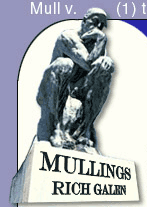|
|

|


The Myth of Bi-Partisan
Rich Galen
Friday July 29, 2011
 Twitter Twitter
Click here for an Easy Print Version
While waiting for the debt limit vote �
The entire near solar system is begging and pleading for Washington to exercise a concept known as "bipartisanship." By "bipartisan" they mean, of course "non-partisan" as in "without regard to political party."
The two-party system is mentioned nowhere in the U.S. Constitution, but there is absolutely nothing non-partisan about our form of government. In fact, I believe that if the founding fathers (there were no founding mothers, back in the day) had known how formalized - maybe fossilized - the two-party system was going to become, they would have found a way to force at least one of these three organizations: The U.S. House, the U.S. Senate or the Executive Branch to be in the control of a party different from the other two.
In Washington everything is divided between two parties - it is muy-partisan. In the very Chambers of the U.S. House and Senate, members of the Republican party sit separately from Democrats. That's where the phrase "other side of the aisle" comes from. Democrats sit on one side of the House or Senate floor, Republicans on the other with a central aisle between them.
The rules of the House and Senate are specifically designed to recognize the existence of two - and only two - parties. There are Majority and Minority Leaders in both the House and the Senate. It is understood they represent which party controls the chamber. In the 112th Congress the Majority leader is a Republican in the House, but a Democrat in the Senate.
In controlling the chamber they also control every committee, every officer (Clerk of the House, Secretary of the Senate, and so on), the schedule of what bill comes to the floor and when it will be considered and just about every other aspect of life in the Capitol complex.
If there were five political parties, there would still be a majority coalition which would be run by the Majority Leader but in the United States Congress, in 2011, there are only two.
There are the odd (and I do mean odd) independents. But, they have to choose to caucus with one of the two existing parties or they won't get committee assignments, seniority, office space or trips to the Paris Air Show.
The Executive branch is no less partisan.
In the beginning, Presidential Electors did not vote for President and Vice President; only for President. Whoever came in second was named VP. In the pesky election of 1800, Aaron "Sure Shot" Burr and Thomas Jefferson tied for President in the Electoral College and the matter was thrown into the U.S. House.*
Jefferson won, but it led to the 12th Amendment which states in part that when the Electors meet
"they shall name in their ballots the person voted for as President, and in distinct ballots the person voted for as Vice-President."
From that has evolved the concept of Republican Administrations and Democrat Administrations.
Anyone who has applied for one of the 3,000 or so jobs as a political appointee in any modern Administration has had to prove his or her fealty to the party which won the Presidency (and, as we have learned today) the Vice Presidency. These are different from the 2 million civil service employees who can be of either party.
To round out the three branches, the President nominates individuals to the Federal courts; Judges to the District and Circuit Courts all the way to Justices of the Supreme Court.
In the nomination and Senate confirmation process for federal judges party loyalty is a huge driver - either moving someone through the procedure quickly, or stalling their appointment depending upon how well the Senate and the President are getting along.
When you hear cable news anchors bemoan the inability of the two parties to play nicely one with the other ask yourself what we call systems which don't have two contentious political parties.
Dictatorship.
On the Secret Decoder Ring today: Links to the 12th Amendment, Aaron Burr, and the Federal Courts. Also a Mullfoto and a Catchy Caption of the Day.
--END --
Copyright © 2011 Barrington Worldwide, LLC
Become a
Paid Mullings Subscriber!
(To join the FREE mailing list or to unsubscribe Click Here)

Current Issue |
Secret Decoder
Ring | Past
Issues | Email
Rich | Rich
Who?
Copyright �2007 Barrington Worldwide, LLC | Site design by Campaign
Solutions. | |
|



